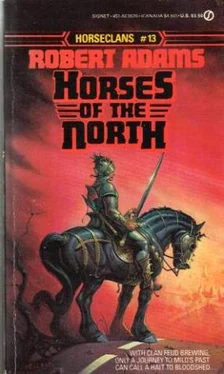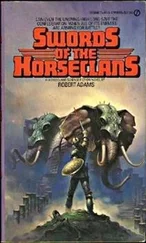It had been later that year when he had chanced across the gaggle of sick, scared, starving children who, under his guidance and tutelage, had become the genesis of the Horseclans folk. By that time, after traveling through countless miles of once-populous countryside that now stank to high heaven of decaying and unburied human corpses, fighting off both there and in the towns and smaller cities where he scrounged for ammunition and supplies the huge packs of hunger-mad, masterless once-pet dogs—these more deadly and dangerous than any pack of wild wolves, since none of them feared mankind and most had recently been dining principally on human flesh—he had come to realize that the immensely complex and interdependent civilization was dead on this continent and quite possibly worldwide for a very long time to come. As for the children he had found, were they to survive and breed more of their race, he would have to teach them to live as savages in a savage, brutal and merciless environment.
Knowing that before too long a time modern firearms and parts and ammunition for them would become unobtainable, he taught them all the bow, at which he was himself expert, taking some of the older boys with him on dangerous expeditions to cities to obtain bows and arrows of fiberglass, metal or wood, even while he experimented with wood, horn, sinew and various natural glues in anticipation of the time when ready-made bows would not be available for the mere taking.
Adept already at living off the wilderness, he imparted to the growing children who now depended upon him some of his vast store of knowledge and skills, then sought through the dead cities and villages and towns for books he and they could read to learn even more. Horses and gear for riding came from deserted ranches and farms, as too did the first few head of cattle, goats and sheep. He had had them bring in swine, too, up until the time he had come across some feral hogs eating the decayed remains of men and women who had died of the plagues; after that, he feared to allow them to eat the flesh of such swine or bears as roamed in the vicinity of former haunts of mankind.
The first generation had grown up, paired off, sired, borne and began to raise a second generation in a settled environment. They farmed and raised livestock, supplementing the produce of lands and herds with hunting game and foraging wild plants, nuts, and the like. They might have stayed thus and there, had not a succession of dry years forced Milo to face the necessity of a move to a place where water still was easily available and the graze was not all dead or dying.
Milo and several of the better riders crossed the western mountains to the valley beyond. There they ran down and caught as many of the feral horses as they could and herded the stock back over the mountains to their holdings. Then Milo led another party back to that same valley, but pressed on farther north, as close as he dared to one of the places that had been nuked.
He found that others had been there long before him, radiation or no radiation, and that all the stores and shops had been most thoroughly looted of anything of utility or value. However, on the outskirts of what had apparently been an industrial park, he and his men lucked across a huge, window-less building. Upon the forcing of a loading-dock door, they found themselves within a cavernous building which had been the warehouse, seemingly, of a department store. It required weeks of work, numerous round trips to thoroughly loot all that they could use from the variegated stocks of artifacts, but by the time that the long caravan of people, horses and herds moved out of the desiccated area that had for so long been their home, the packs and the travoises were heavy, piled high with necessaries for man and for beast.
To everyone’s great disappointment, the dusty stock had not included a single firearm or any ammunition of any sort, caliber or description; however, after their thorough lootings, every man, woman and child now was provided with a bow of fiberglass or metal, as many arrows and razor-edged hunting heads and spare bowstrings as could be carried, and two or three knives.
Although Milo and the others had seen no living human on their trips to the western side of the mountains, not even any recent traces of humans, the trips had not been uneventful. On the way back east from the very first one, all walking and leading their heavily laden horses and therefore moving far more slowly than they had on the journey west, they had had the picket line attacked one night, a mule killed and dragged off into the darkness.
Milo and those others armed with heavier-caliber firearms tracked the raider and found themselves, eventually, confronting a huge, full-grown Siberian tiger. But huge and vital as the beast was—some eleven feet from nose to tail tip!—he proved no real match for six crack shots armed with big-bore hunting rifles, for all that the monstrous cat exhibited no fear of man and charged almost immediately. And he was just the first animal they had to kill during the course of stripping that warehouse of things they could use.
They shot two adult leopards within the remains of the industrial park, near the warehouse, while on a solitary, exploratory jaunt, Milo was faced by and had to kill with his pistol a jaguar. He found what he thought to be the answer to the existence hereabouts of these non-native beasts during another, longer trip, a wide swing around the radioactive core city. In an area that still was partially fenced, grazed and browsed a mixed herd of giraffes, wildebeests, zebras and several varieties of antelope. Having spent some years, off and on, in Africa, Milo was able to recognize waterbucks, blesboks, springboks, Thomson’s gazelles, impalas and what, at the distance, looked much like a huge eland. He kept a good distance, observing the herd through binoculars, because he had come across tracks and immense piles of dung that led him to believe that there were elephants and rhino about the place. A bit farther on, he spotted another mixed herd, this one including wildebeests, ostriches, oryxes, zebras and half a dozen types of antelope or gazelle with which he was unfamiliar, but also some specimens of big, handsome, spotted axis deer, a few other cervines he could recognize by the antlers as Pere David’s deer and a buck and two or three does that could have been red deer, sambar deer or small American elk. It was when he noticed a pride of lions moving through the high grass that he recalled that discretion was the better part of valor and also the fate of the curious tabby cat.
Upon his return to his party of warehouse looters, he ordered the horses stabled within the huge building by night and well guarded by day.
“I’ve found one of the places that the tiger, the leopards and maybe that jaguar, too, came from. Some of you men may recall being taken as young children, before the war and all, to drive through huge parks and view wild animals from all over the world. Well, there’s one of them—pretty big and well stocked, too, from the little I saw of it—only a few days’ ride to the northeast of where we are now. A number of the fences are down, and I’d bet that that’s where the predatory cats wandered down here from. As I recall, lions and tigers don’t get on too well in the same territory, and since I saw a big pride of lions up there, the tiger may have felt outnumbered and come down here to live on feral horses and deer. Those two leopards and the jaguar may very well be the reason why this area is no longer ravaged by packs of wild dogs, for both cats have a fondness for dog flesh. I’m just thankful that none of the big cats seem to have had the inclination to go east and cross the mountains to our valleys.”
The migration proved long and hard and slow, with the same drought conditions that had driven them all from their homes seemingly prevailing ail along their line of march. Game was very scarce, and many a night they all had nothing more than a few small bites of rattlesnake and/or rabbit to sustain them until something bigger was unwily enough to fall to their hunters or one or more of their herd animals succumbed to lack of graze and water.
Читать дальше












